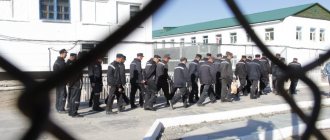ST 314 of the Criminal Code of the Russian Federation.
1. Malicious evasion of a person sentenced to restriction of freedom from serving a sentence is punishable by forced labor for up to one year or imprisonment for the same term.
2. Failure to return to a correctional institution of a person sentenced to imprisonment, who is allowed to leave the correctional institution, after the expiration of the departure period, or failure to appear at the appropriate body of the penal system of a person sentenced to imprisonment, who has been granted a deferment of execution of the sentence or serving the sentence, upon expiration of the deferment period - punishable by forced labor for up to two years or imprisonment for the same period.
3. Evasion of a person suffering from a disorder of sexual preference (pedophilia), which does not exclude sanity, from the application of compulsory medical measures against him is punishable by imprisonment for a term of up to one year.
Notes.
1. Criminal liability for committing an act provided for in the first part of this article occurs in the case when restriction of freedom is assigned to a person as an additional punishment.
2. Criminal liability for committing an act provided for in part three of this article occurs in the case when compulsory medical measures are applied to a person after serving his sentence.
Commentary to Art. 314 Criminal Code
1. The objective side is expressed in the form of inaction regarding: a) malicious evasion (Part 4 of Article 58 of the Penal Code of the Russian Federation) of a person from serving a sentence in the form of restriction of freedom (Part 1); b) failure to return to a correctional institution a person sentenced to imprisonment, who is allowed to leave the correctional institution, after the expiration of the departure period; c) failure to appear at the relevant body of the penal system of a person sentenced to imprisonment, who has been granted a deferment of execution of a sentence or serving a sentence, upon expiration of the deferment period (Part 2); d) evasion of a person suffering from a disorder of sexual preference (pedophilia), which does not exclude sanity, from the application of compulsory medical measures to him (Part 3).
Failure to appear, untimely return of a convicted person to the place of serving his sentence for reasons beyond his control (lack of communication, natural disaster, etc.) do not constitute a crime.
2. Special subject: a person sentenced to restriction of freedom imposed as an additional punishment in accordance with Note 1 to the article (Part 1); a person sentenced to imprisonment who is allowed to leave the correctional institution, or a person sentenced to imprisonment who is granted a deferment of execution of the sentence or serving the sentence (Part 2); a person suffering from a disorder of sexual preference (pedophilia), which does not preclude sanity, who has been assigned compulsory medical measures in accordance with Note 2 to the article after serving his sentence (Part 3).
Commentary to Art. 314.1 of the Criminal Code of the Russian Federation
1. The object of the crime is the relationship that ensures the implementation of administrative supervision.
Administrative supervision is understood as monitoring carried out by internal affairs bodies over the compliance of a person released from prison with temporary restrictions on his rights and freedoms established by the court, as well as over the fulfillment of the duties assigned to him. It is established to prevent crimes and other offenses, to provide individual preventive influence in order to protect state and public interests in relation to a person released or released from prison and who has an outstanding or unexpunged conviction for committing:
1) a grave or especially grave crime;
2) crimes in case of repeat crimes;
3) an intentional crime against a minor.
The grounds for administrative supervision are differentiated depending on to whom it is established. A person released from prison may be subject to it if, while serving his sentence in prison, he was recognized as a persistent violator of the established order; a person released from prison - if within a year he commits two or more administrative offenses against the order of government and (or) administrative offenses encroaching on public order and public safety, public health and public morality.
It must be borne in mind that in relation to persons convicted of committing a crime against the sexual integrity and sexual freedom of a minor, as well as for committing a crime with a dangerous or especially dangerous recidivism, administrative supervision is established regardless of the specified grounds.
The period of administrative supervision depends on the category of person in respect of whom it is established (Article 5 of the Federal Law of April 6, 2011 N 64-FZ “On Administrative Supervision over Persons Released from Prison”), if there are grounds, it can be extended or terminated early.
———————————
RG. 2011. April 8. The law came into force on July 1, 2011.
During administrative supervision, administrative restrictions are applied, which can be partially canceled or, conversely, supplemented.
2. The objective side is expressed in non-compliance with the following requirements of administrative supervision:
a) failure to arrive without good reason upon the release of a person from places of imprisonment to his chosen place of residence or stay within the period determined by the administration of the correctional institution. The validity of reasons is an evaluative concept; it is determined based on the specific circumstances of violation of the specified deadlines;
b) unauthorized abandonment of the person’s place of residence or stay.
The duties of the supervised person are enshrined in Art. 11 of the Federal Law “On administrative supervision of persons released from prison.”
The crime has a formal composition and is considered completed from the moment one of these acts is committed.
3. The subjective side is characterized by direct intent, and in relation to unauthorized leaving of place of residence or stay and a special purpose - evasion of administrative supervision.
4. Special subject of a crime - a person in respect of whom administrative supervision has been established.
Second commentary to Art. 314 of the Criminal Code of the Russian Federation
1. A convicted person is considered to be maliciously evading serving a sentence of restriction of freedom if:
a) committed a violation of the order and conditions of serving a sentence within one year after the application of a penalty in the form of an official warning;
b) refused to use technical means of control and supervision; c) disappeared from his place of residence and his whereabouts have not been established for more than 30 days;
d) did not arrive within the prescribed period at the criminal-executive inspection at the place of residence in accordance with the issued order (Article 58 of the Penal Code of the Russian Federation).
2. The subject of the crime is a person in respect of whom restriction of freedom is prescribed as an additional type of punishment.
3. Failure to return to places of imprisonment (Part 2 of Article 314 of the Criminal Code) is a specific form of evasion of punishment. Criminal liability arises if the convicted person does not return to prison, with the goal of evading serving imprisonment.
If a person who has been granted a deferment of execution of a court sentence or serving a sentence fails to appear at the appropriate body of the penal system, the crime will consist of evading the return of the convicted person to the appropriate institution to serve the remainder of the sentence.
4. The subject of the crime is a person sentenced to a sentence of imprisonment or serving it.
5. A person who has violated the order and conditions of compulsory treatment within one year after a written warning was applied to him, as well as a patient whose whereabouts are unknown to the criminal-executive inspection for more than 30 days, is considered to be evading compulsory medical measures.
6. The subject of the crime is special: a person suffering from a disorder of sexual preference (pedophilia), which does not exclude sanity.
7. The subjective side of all the above crimes is characterized by direct intent.
CASE No. 1-366/2021
SENTENCE
In the name of the Russian Federation
October 18, 2022 Central District Court <address> of the Republic of Crimea of the Russian Federation composed of: presiding judge - FULL NAME2,
under the secretary - full name 12
with the participation of the state prosecutor – FULL NAME3,
defendant - FULL NAME1
defender – FULL NAME4,
having examined in open court in the city of Simferopol a criminal case on charges FULL NAME1, DD.MM.YYYY year of birth, native <address>, citizen of the Russian Federation, with secondary specialized education, single, unemployed, previously convicted: DD.MM.YYYY Central District Court <address> under Art. 159 part 2 of the Criminal Code of the Russian Federation to 2 years of suspended imprisonment, probationary period of 2 years; DD.MM.YYYY Central District Court <address> under Part 2 of Art. 160, paragraph “a”, part 3, art. 158, part 5 art. 69, part 1 of article 70, article 74 of the Criminal Code of the Russian Federation to 3 years 6 months of imprisonment, released after serving DD.MM.YYYY, registered and residing at the address: <address> “A”, <address>, in committing a crime under Part 1 of Art. 314.1 of the Criminal Code of the Russian Federation,
INSTALLED:
FULL NAME1 by the verdict of the Central District Court <address> of the Republic of Crimea dated DD.MM.YYYY, which entered into legal force DD.MM.YYYY, was convicted under paragraph “a” of Part 3 of Art. 158, part 2 art. 160 of the Criminal Code of the Russian Federation to 3 years 6 months of imprisonment to be served in a general regime colony. DD.MM.YYYY FULL NAME1 was released after serving his sentence from IK No. Federal Penitentiary Service of Russia in the Kabardino-Balkarian Republic. In accordance with the Federal Law dated DD.MM.YYYY No. 64-FZ “On administrative supervision of persons released from prison” by the decision of the Chegem District Court of the Kabardino-Balkarian Republic dated DD.MM.YYYY, which entered into legal force DD.MM .YYYY, administrative supervision has been established for Full Name 1 for a period of one year, with the following administrative restrictions: oblige to appear once a month at the internal affairs agency at the place of residence, stay or actual location for registration; prohibit travel outside the Republic of Crimea without permission from the internal affairs body.
DD.MM.YYYY inspector of the direction for the implementation of administrative supervision of the OUUP and PDN of the police department No. “Central” of the Ministry of Internal Affairs of Russia at <address> FULL NAME1 was registered in the police department No. “Central” of the Ministry of Internal Affairs of Russia at <address> and at the same time FULL NAME1 was familiarized with the administrative restrictions of his rights and freedoms established by the court, including being warned of criminal liability for unauthorized leaving his place of residence located at the address: <address>A <address>, and also familiarized with the schedule of his arrival at the police department No. “Central” Regional Ministry of Internal Affairs of Russia at <address>. In connection with repeated violations of the restrictions established by the court, the decision of the Central District Court <address> of the Republic of Crimea dated DD.MM.YYYY, which entered into legal force DD.MM.YYYY, in relation to FULL NAME1, administrative supervision was extended for 6 (six) months, then is up to DD.MM.YYYY, with the establishment of the following restrictions: prohibition of travel outside the Republic of Crimea without permission from the internal affairs bodies; registration in the police department No. "Central" of the Ministry of Internal Affairs of Russia at <address> once a month every second Monday of the month from 09:00 to 18:00, however, the supervised Full Name1, reliably knowing about all the above restrictions, realizing his criminal intent, aimed at evading administrative supervision, realizing the illegal nature of their actions, in violation of the requirements of clause 5, part 1, article 11 of the Federal Law of DD.MM.YYYY No. 64-FZ “On administrative supervision of persons released from prison” , knowing about the need to notify police officers within three working days about a change of residence, during the period from DD.MM.YYYY to DD.MM.YYYY, he arbitrarily left his chosen place of residence, located at the address: <address>A < address>, in order to evade administrative supervision, while not informing the police officers of OP No. “Central” of the Ministry of Internal Affairs of Russia at <address>, thereby depriving the police officers of the opportunity to monitor compliance with the restrictions established by the court, and deliberately evaded administrative supervision in the period from DD.MM.YYYY to DD.MM.YYYY.
FULL NAME1 fully agreed with the accusation and supported the petition filed when fulfilling the requirements of Article 217 of the Code of Criminal Procedure of the Russian Federation for a verdict in a special manner without conducting a judicial investigation.
At the court hearing, the defendant’s defense lawyer, lawyer FULL NAME4, did not challenge the admissibility of the evidence obtained during the inquiry, and did not declare a violation of the defendant’s procedural rights during the investigation of the case.
The state prosecutor also agreed to consider the case in a special manner without conducting a judicial investigation.
The court made sure that the defendant was aware of the nature and consequences of his petition; the petition was submitted voluntarily and after consultation with the defense lawyer. He is aware of the consequences of sentencing without a trial.
The charge brought against FULL NAME1 is reasonably supported by evidence collected in the criminal case, specified in the indictment and examined by the court: a report on the detection of signs of a crime from DD.MM.YYYY (case file 6); protocol of inspection of the scene of the incident dated June 25, 2021 (case file 7-13); by the verdict of the Central District Court <address> from DD.MM.YYYY (case sheet 14-15); decision of the Chegem District Court of the KBR dated DD.MM.YYYY (case sheet 16-17); a copy of the decision of the Central District Court <address> from DD.MM.YYYY (case sheet 20-22); a copy of the order No. regarding FULL NAME1 from DD.MM.YYYY (case file 28); warning FULL NAME1 about administrative and criminal liability (case file 32); confession FULL NAME1 from DD.MM.YYYY (case file 36); protocols of interrogation of witnesses FULL NAME5, FULL NAME6, FULL NAME7, FULL NAME8, FULL NAME9 (case file 40-41, 42-43, 44-45, 46-48, 51-52), protocol of interrogation FULL NAME1 as an accused (case file 64 -67).
Thus, the totality of this evidence, in the opinion of the court, objectively confirms the guilt of FULL NAME1 in committing the crime charged to him.
After checking the materials of the criminal case, the court came to the conclusion that the accusation, which FULL NAME1 agreed with, is justified and supported by evidence collected in this criminal case.
The court qualifies the actions of FULL NAME1 under Part 1 of Art. 314.1 of the Criminal Code of the Russian Federation, as unauthorized abandonment by a supervised person of his place of residence, committed for the purpose of evading administrative supervision.
There are no grounds to terminate the criminal case.
When assigning punishment, the court takes into account the nature and degree of public danger of the crime and information about the defendant’s personality and state of health.
FULL NAME1 committed a crime of minor gravity, is not registered with a narcologist or a psychiatrist (case files 85-86, 87-88), and is characterized by mediocre residence (case file 92).
According to paragraph “and” part 1 of Art. 61 of the Criminal Code of the Russian Federation, as a mitigating circumstance, the court recognizes a confession. According to Part 2 of Art. 61 of the Criminal Code of the Russian Federation, the court recognizes as mitigating circumstances - admission of guilt, sincere repentance for the deed, state of health.
In accordance with Article 63 of the Criminal Code of the Russian Federation, the court did not establish any aggravating circumstances.
Taking into account all the circumstances of the case in their entirety, the personality of the defendant, the circumstances of the crime committed, the gravity of the crime, mitigating circumstances, the impact of the imposed punishment on the correction of the defendant and on the living conditions of his family, the court came to the conclusion that the defendant could be sentenced to - compulsory work.
According to the court, this particular type of punishment will be necessary and sufficient for the correction and re-education of the defendant. In this case, the goals of punishment provided for in Article 43 of the Criminal Code of the Russian Federation, consisting of correcting the convicted person and preventing the commission of new crimes, will be achieved.
Taking into account the circumstances of the defendant’s commission of a crime, information about his personality, the grounds for applying the provisions of Art. to the defendant. 64 of the Criminal Code of the Russian Federation is not available.
Guided by Art. Art. 307-309, 314-317 Code of Criminal Procedure of the Russian Federation, court –
SENTENCED:
Find FULL NAME1 guilty of committing a crime under Part 1 of Article 314.1 of the Criminal Code of the Russian Federation and sentence him to compulsory labor for a period of 240 hours.
The preventive measure, in the form of a written undertaking not to leave the place and proper behavior, FULL NAME1, shall remain the same until the sentence enters into legal force.
The verdict can be appealed to the Supreme Court of the Republic of Crimea through the Central District Court <address> within 10 days from the date of the verdict, in compliance with the requirements provided for in Art. 317 Code of Criminal Procedure of the Russian Federation.
The convicted person has the right to petition in the appeal for participation in the consideration of the criminal case by the court of appeal.
Judge: Gulevich Yuri Grigorievich
Third commentary to Article 314 of the Criminal Code of the Russian Federation
1. The commented article provides for liability for three independent elements of crime. According to Part 1, the direct object of the crime is the procedure established by regulations for the execution of an additional punishment imposed by the court in the form of restriction of freedom. The objective side of this crime is characterized by the commission of an act in the form of inaction - malicious evasion, i.e. failure to comply with the requirements imposed by the court on the convicted person when imposing an additional punishment in the form of restriction of freedom, the content of which is enshrined in Art. 53 of the Criminal Code as amended. Federal Law of December 27, 2009 N 377-FZ. Responsibility comes after the second written warning issued by the criminal-executive inspection body. The elements of the crime are formal, the end point is associated with the beginning of malicious evasion. The subjective side is characterized by guilt in the form of direct intent. A special subject of a crime is a convicted person who has been given an additional punishment in the form of restriction of freedom.
2. According to Part 2 of the commented article, the immediate object is the procedure established by regulatory acts for the execution of a sentence imposed by the court in the form of imprisonment, taking into account the existing deferments. The objective side consists of inaction, expressed in the failure to return a person sentenced to imprisonment to the place of serving the sentence after the expiration of the period of departure or in the failure to appear at the relevant body of the penal system of a person who has been granted a deferment of execution of the sentence or serving the sentence after the expiration of the deferment period. The crime is considered completed from the moment the convicted person actually fails to return to the place of serving the sentence of imprisonment within the period established by the administration of the correctional institution or the court. The subjective side in this case is characterized by guilt in the form of direct intent. The subject of the crime is a convicted person who has been sentenced to imprisonment and is allowed to leave the correctional institution or who has been granted a deferment of the execution of the sentence or serving the sentence.
3. According to Part 3 of the commented article, the direct object of the crime is the established procedure for applying compulsory medical measures to a person suffering from a disorder of sexual preference (pedophilia), which does not exclude sanity (see commentary to Article 97 of the Criminal Code). The objective side consists of the inaction of a person - the evasion of a convicted person released after serving his sentence from the application of compulsory medical measures against him. It appears that liability begins after just one failure to appear without good reason at the relevant medical institution. The corpus delicti is formal.
The subjective side is characterized by guilt in the form of direct intent and a special purpose - the desire to evade appropriate medical measures.
A special subject of a crime is a convicted person, to whom, after serving his sentence, the court has imposed compulsory medical measures. ‹ Article 313. Escape from a place of imprisonment, from arrest or from custodyUp Article 314.1. Evasion of administrative supervision or repeated failure to comply with restrictions or restrictions established by the court in accordance with federal law ›
Commentary on Article 314.1 of the Criminal Code of the Russian Federation
1. The object of the crime is the relationship that ensures the implementation of administrative supervision.
Administrative supervision is understood as monitoring carried out by internal affairs bodies over the compliance of a person released from prison with temporary restrictions on his rights and freedoms established by the court, as well as over the fulfillment of the duties assigned to him. It is established to prevent crimes and other offenses, to provide individual preventive influence in order to protect state and public interests in relation to a person released or released from prison and who has an outstanding or unexpunged conviction for committing:
1) a grave or especially grave crime;
2) crimes in case of repeat crimes;
3) an intentional crime against a minor.
The grounds for administrative supervision are differentiated depending on to whom it is established. A person released from prison may be subject to it if, while serving his sentence in prison, he was recognized as a persistent violator of the established order; a person released from prison - if within one year he commits two administrative offenses against the order of government and (or) administrative offenses encroaching on public order and public safety, public health and public morality, or more.
It must be borne in mind that in relation to persons convicted of committing a crime against the sexual integrity and sexual freedom of a minor, as well as for committing a crime with a dangerous or especially dangerous recidivism, administrative supervision is established regardless of the specified grounds.
The period of administrative supervision depends on the category of person in respect of whom it is established (Article 5 of the Federal Law of April 6, 2011 N 64-FZ “On administrative supervision of persons released from places of imprisonment” <1>), if there are grounds it may be extended or terminated early.
——————————— <1> NW RF. 2011. N 15. Art. 2037.
During administrative supervision, administrative restrictions are applied, which can be partially canceled or, conversely, supplemented.
2. The objective side is expressed in non-compliance with the following requirements of administrative supervision:
a) failure to arrive without good reason upon the release of a person from places of deprivation of liberty to his chosen place of residence or within the period determined by the administration of the correctional institution. Good reasons are an evaluative concept; they are determined based on the specific circumstances of violation of the specified deadlines;
b) unauthorized abandonment of the person’s place of residence or stay.
The responsibilities of the supervised person are enshrined in Art. 11 of the Federal Law “On administrative supervision of persons released from prison.”
The crime has a formal composition and is considered completed from the moment one of these acts is committed.
3. The subjective side is characterized by direct intent, and in relation to unauthorized leaving of place of residence or stay and a special purpose - evasion of administrative supervision.
4. Special subject of a crime - a person in respect of whom administrative supervision has been established.




